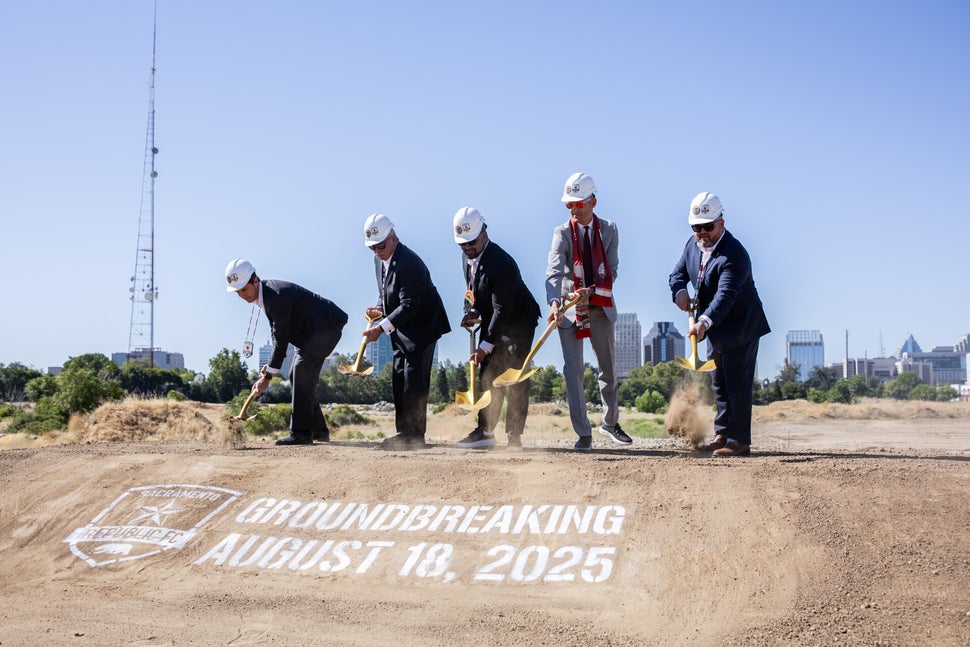By Mauricio Segura August 18, 2025

Photo: Courtesy Sacramento Republic FC
Something beyond just a chunk of dirt shifted this morning in Sacramento. This wasn't merely about building a stadium; it was about reclaiming identity, sovereignty, and a community’s long-understood rightful place. Sacramento Republic FC and the Wilton Rancheria, together, turned ceremony into something powerful: a homecoming disguised as a groundbreaking.
The date was no coincidence. Exactly 67 years earlier, on August 18, 1958, Congress enacted the California Rancheria Termination Act, stripping federal recognition from the Wilton Rancheria and dozens of other tribes. Now, at that same spot, the tribe isn’t just remembered, it's rebuilding. “This is not our groundbreaking, this is our homecoming,” declared Wilton Rancheria Chairman Jesus Tarango, putting hard truth and poetic justice into a single breath.
Across the chunk of land in the Railyards, construction is already stirring. Pre-construction activities, grading and utility setup, had already kicked off. Turner Construction is pulling the strings as the general contractor. Republic FC Managing Partner Kevin Nagle didn’t mince words either. “Our path has not been easy… in 2027, when the first ball is kicked here… it will be more than a match.” Later, he added a broader frame: “Today is something we’ve been working toward for 12 years. For over a decade we’ve been told no more times than I can count.”
Also standing in front of Sacramento’s gleaming skyline, and amid some loud cowbells from the Tower Bridge Battalion supporters group, Wilton Rancheria’s COO Chris Franklin summed it up best: “At the time, it felt like a whisper in a roomful of doubt.”
What came next wasn’t just sledgehammers and speeches, it was vision. The project, pegged at $175 million and privately financed, will seat 12,000 fans while expanding for concerts and events. Alongside the stadium, an entertainment district is rising in the Railyards, part of a wider transformation of the 31-acre site.
For fans, the call to action was immediate. Deposits for 2027 season tickets began at just $9.16 and came wrapped in good karma: every deposit helps fund mini-soccer pitches across the region. The structure of the deposit tiers was smart too: $9.16 placed you in the supporters section or general seating at $25, premium at $50, or splurge for a luxury suite at $500.
Looking back, this stadium’s journey is a roller-coaster of hope, disappointment, and outright hustle. Back in 2016 through 2019, Republic FC was gunning for MLS, had designs for a larger venue, even got a December 2019 nod as MLS’s 29th team. Then 2021 hit, a pandemic struck, an investor pulled out, and everything halted. November 2024 brought the pivot: Wilton Rancheria became majority owner, and a renewed $252 million, 12,000-seat plan was green-lit, targeted for a 2027 opening.
Until that glorious day, the Republic keep playing at Heart Health Park, their cozy 11,500-seat home at Cal Expo.
The timeline at a glance reads like a long-fought march. It all began back in the early 2010s, when Sacramento Republic FC launched, won titles, and ignited fans. Plans for a downtown stadium emerged, designs revealed, and city council gave approval, but MLS dreams stalled when investors pulled out in 2021. Then everything rebooted in late 2024, with the Wilton Rancheria at the helm. By summer 2025, legacy, funding, and execution aligned, culminating in a ceremony that was as symbolic as it was literal. Construction is expected to carry through 2026 into 2027 when the stadium opens, forever changing Sacramento’s skyline and story.
Why this matters, beyond the bricks and the goals, is clear. This groundbreaking is a dual victory, for the sport, yes, a contemporary venue for an ambitious club, but even more so for the Wilton Rancheria. In reclaiming their land, their sovereignty, and their narrative, they proved that history isn’t destiny, it’s dialogue. And as Chairman Tarango said, a day meant to erase could now be a day that reminds, rebuilds, and rallies.
So when fans cheer that first whistle in 2027, it won’t be just about what happens on the pitch. It will be about how dreams, long denied, were dug up and dug in.















